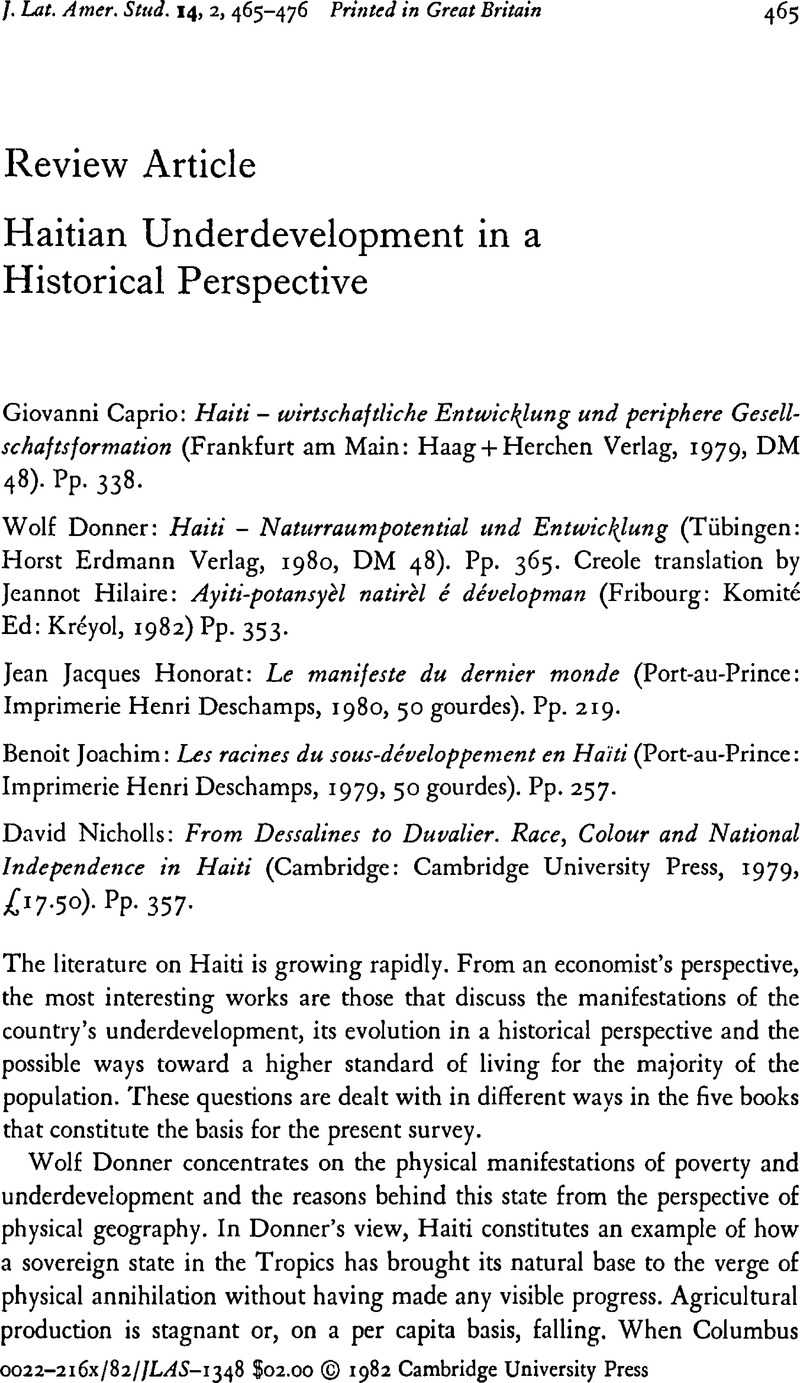No CrossRef data available.
Article contents
Haitian Underdevelopment in a Historical Perspective
Published online by Cambridge University Press: 05 February 2009
Abstract

- Type
- Review Article
- Information
- Copyright
- Copyright © Cambridge University Press 1982
References
1 Cf., Mats Lundahl, Peasants and Poverty: A Study of Haiti (London, Croom Helm, 1979), Chapters 7 and 8.Google Scholar
2 Ibid., pp. 266–7.
3 See, in particular, Lacerte, Robert K.: ‘The First Land Reform in Latin America: The Reforms of Alexander Pétion, 1809–1814’, Inter-American Economic Affairs, Vol. 28 (1974/1975);Google ScholarMurray, Gerald F.: ‘The Evolution of Haitian Peasant Land Tenure: A Case Study in Agrarian Adaptation to Population Growth’ (Ph.D. thesis, Columbia University, New York, 1977), Chapter, and Lundahi, op. cit., Chapter 6.Google Scholar
4 Nicholls, , p. 15.Google Scholar
5 Ibid., pp. 1, 2.
6 The American occupation of Haiti served as a rallying point for a Haitian literature of protest and national consciousness. A littérature de combat emerged which was not to be without a certain influence on political life during a later period of Haiti's history. A fascinating account of this is given in Michael Dash, J.: Literature and Ideology in Haiti, 1915–1961 (London and Basingstoke, Macmillan, 1981. Pp. 213). Young writers proceeded to reevaluate Haitian society. The values of the traditional elite were challenged. Nationalism and cultural authenticity with emphasis on the African past, as expressed by the indigenist movement, put Haiti and the specifically Haitian into focus and repudiated the influence of American civilization. Much of this vigorous literary movement was translated ‘into politically absolutist solutions’ (Dash, p. 98) where the Négritude movement in due time was exploited by Duvalier in his mythical insistence on nationalism, coupled with muddled racial theories which were perfectly suited to back up a dictatorship building not on the interests of the traditional elites but on the emerging black bourgeoisie instead.CrossRefGoogle Scholar
7 Cf., e.g. Jean-Claude, García-Zamor: ‘Papadocracy’, Caribbean Review, Spring 1970.Google Scholar
8 Quoted by Donner, , note, p. 338.Google Scholar
9 For a discussion of this tradition, see Lundahl, op. cit., Chapter 7.
10 Cf. the discussion in Rotberg, Robert I. with Clague, Christopher K.: Haiti: The Politics of Squalor (Boston, Houghton Mifflin, 1971), pp. 348 ff.Google Scholar
11 Nicholls, , pp. 237, 246.Google Scholar
12 Resistance to change in Haitian agriculture is discussed in detail in Lundahl, op. cit., Chapter 12 and in Mats Lundahl: ‘Peasants, Government, and Technological Change in Haitian Agriculture’ in Illy, Hans F. (ed.): Public Administratioa and Rural Development in the Caribbean (Munich, Weltforum, forthcoming).Google Scholar
13 The causes of the American occupation of Haiti are discussed in Hans, Schmidt: The United States Occupation of Haiti, 1915–1934 (New Brunswick, Rutgers University Press, 1971)Google Scholar and in Suzy, Castor: La ocupación norteamericana de Haití y sus consecuencias (México, Siglo Veintiuno, 1971).Google Scholar
14 Cf. Schumacher, E. F.: Small is Beautiful. A Study of Economics as if People Mattered (London, Sphere Books, 1974).Google Scholar
15 This has much in common with the argument advanced in Cipolla, Carlo M.: Guns and Sails in the Early Phase of European Expansion, 1400–1700 (London, Collins, 1965).Google Scholar
16 Honorat, , op. cit., p. 119.Google Scholar




